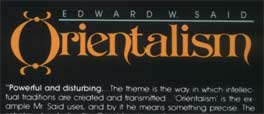
Today centers around 2 salient facts: Cable internet access was enabled in the apartment, and I “led” a class discussion of Edward Said’s controversial (and influential) book, “Orientalism”
Actually, I was desperately trying to come up with good questions for said discussion when we got a ring from the cable guy. Up he came, fiddled with the cable a bit, plugged in a cable modem, made a 5 minute call to headquarters to enable the connection, and there we were. Oddly enough, he left me only a receipt: no documentation, no charges. Peculiar.
Then I went back to formulating discussion questions. Not east. They’ve got to somehow get at the essence of the topic, while forgoing judgment, and engaging everybody in the discussion. Make them too broad, and the discussion goes nowhere. Make them too narrow, and nobody will have anything to say. A balancing act.
Meanwhile in my other class, we had a discussion that essentially centered on how one can write history based upon problematic sources. The issue in early Islamic history is that we really have no original documents from, say 622-750AD. What we do have is the Quran, and a large supply of hadith, narratives of things the prophet or his companions did or said, via some chain of transmission. Since none of these documents are provably from the period they ostensibly describe, there is the question of how much of it is retrojection (projection of current circumstances into the past) or downright fabrication (indeed, with hadith, there is a whole field in Islamic theology devoted to distinguishing the good ones from the bad).
For the discussion itself, which started at 5PM, the professor began with a presentation of Orientalist art. You don’t need to see a lot of it to see many of the traditional Orientalist myths cropping up: the exoticized Orient, the eroticized Orient, the timeless Orient, and so on. The discussion actually more or less ran itself, though my questions proved less helpful than I’d hoped. One of the things we did get at though was the sense that Orientalism as a discourse influenced on many different levels, and in different ways. The fact that two individuals are embedded in the Orientalist discourse does not, a priori tell one a whole lot about what those individuals actually did or thought. This is something that many of Said’s critics maintain he discounted, but his actual position seems reasonably nuanced.
After the discussion, I went home and cooked some more spaghetti. Seems like Wednesday is spaghetti day. This time I think I undercooked it though. Despite having eaten spaghetti for at least half my meals this last week, I’m still not sick of it. What I am sick of is discovering that the still unripe fruit (nectarines and peaches) that I bought is rotting from the inside. Ditto for my avocado. Not cool.
So the Orient is cabled, and I’m tired.
